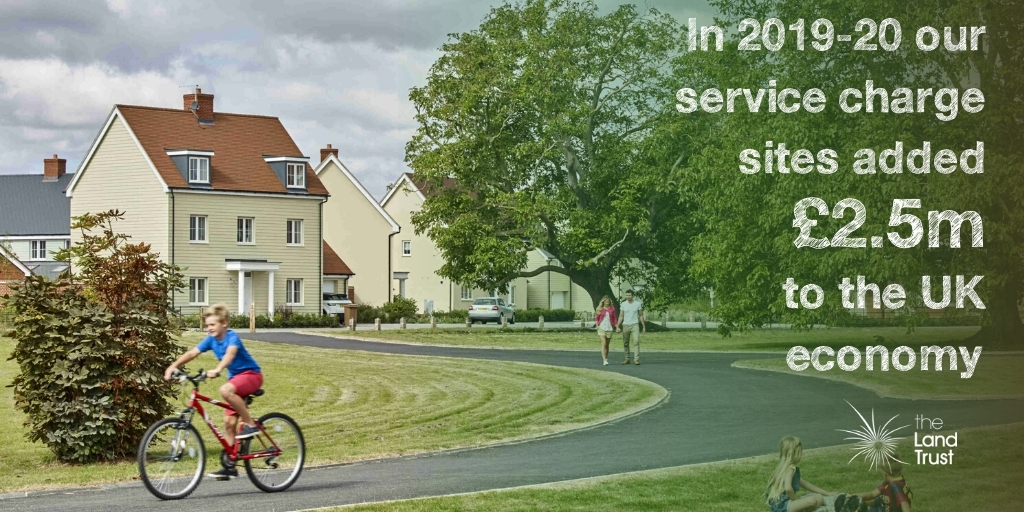22nd July 2020
National land management charity, the Land Trust, has called for property developers to consider green space a vital component of all new developments, and to put a long term plan for stewardship in place at the commencement of a development, to maintain these areas for the long term benefit of homeowners and the wider community.
The call for action comes as the Trust publishes the results of its economic and social value model, showing the value created around the charity’s service charge sites for the first time.
The model shows that in 2019-20 nearly £2.5 million of economic and social value was created from the management of the green spaces around the Trust’s service charge sites. This figure rises to over £16 million when the uplift in property prices is taken in to consideration.
Land Trust Chief Executive, Euan Hall, said:
“For the last couple of years the Trust has been evaluating the economic impact that the management of our green spaces creates. This year for the first time we have applied that model specifically to our service charge sites to try and ascertain the impact we are having on these areas, the homeowners and the wider community.
“The results are very encouraging and we are pleased to see the benefits that we are having on the communities we serve. However these benefits don’t happen by accident. They are created by how the green spaces are used and managed. It requires the right vision, management, governance and funding structures, and over the last few years we have worked with developers such as Countryside Properties and others to manage our spaces in a way that has a positive impact on everyone.
“Our social value model provides overwhelming evidence of the need for green infrastructure around new developments which is managed for the long term. Too often the public open spaces are an afterthought, and neglected or abandoned once the development is complete. We feel very strongly that this should no longer be allowed to happen. We want this to be a top priority for developers going forward.”
Since taking over the management of its first service charge site in 2016, the Trust has expanded this area of the charity’s business rapidly, and now has responsibility for the management of green space on nine service charge sites, on behalf of over 4,500 homeowners.
Hall continued:
“We have all seen, and experienced, a new found appreciation for green spaces throughout the lockdown imposed to deal with the threat of Covid-19. Being able to get outdoors during this incredibly difficult time has had a hugely positive effect on people’s physical and mental wellbeing.
“At the Land Trust we recognise that creating a new community doesn’t end when the houses are built. This is just the beginning of helping to build new, healthy, inclusive and thriving communities.
“Our belief is that the success of a place should be judged on how the green space within a development looks in five, 10 or 20 years’ time and the impact it has had on the people who call it home.
“We aren’t just calling on developers to do this out of the goodness of their heart. The evidence from our model clearly suggests that considering the green infrastructure, what it looks like and the role it plays in the wider development at the very outset, adds significant value to properties.”
The Trust’s economic and social value model was developed in partnership with AMION Consulting and enables the Trust to measure its impact by assessing the benefits of its management philosophy against the charity’s five key charitable objectives of:
• Environment and biodiversity
• Health and wellbeing
• Education and learning
• Economic vitality
• Community cohesion and volunteering
The model provides evidence based, measurable indicators of the benefits of well managed green space for communities. Contributions to this overall economic and social value from the Trust’s service charge sites come from a variety of areas and are either classified as a cost saving to the public purse or gross value added:
• Health care cost savings: £57,111
• Adults engaged in training: £9,039
• Land management and use: £1,075,189
• Supply chain expenditure: £121,931
• Tourism: £115,114
• Workforce development (GVA): £47,530
• Workforce development (cost saving): £27,997
• Recreational and cultural value: £732,079
• Community Engagement: £94,900
Alan Carter, Director of Portfolio Management for the Land Trust, has overall responsibility for the management of the Trust’s green spaces. Following the Covid-19 pandemic Carter believes there will be more pressure on organisations, both in the UK and across the globe to take responsibility for creating a green and sustainable future.
Carter said:
“The outbreak of Covid-19 has seen an increased appetite from the general public for a cleaner, greener world. Everyone will, and should be expected, to do their bit.
“As a charity with the environment at the core of what we do, we want to be at the very heart of this green recovery. We aren’t trying to put pressure on property developers by publishing these results today. We know that they can’t do it alone, but we hope that by showing them the wider benefits they will take this issue far more seriously and work with organisations like ourselves to manage the spaces in such a way that improves the lives of people in the community for years to come.”

If you have any questions or queries about what we do or how to go about working with us we'd love to hear from.
Contact usWe are always on the look out for enthusiastic, committed people who want to make a real and lasting difference in their local community.
Get Involved